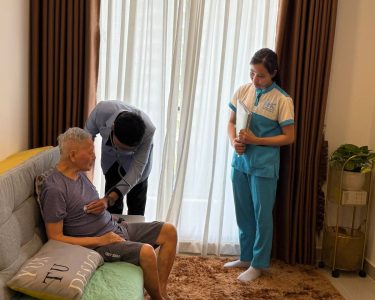By Chanroeun Pa
This year, Cambodia celebrates Teachers’ Day under a powerful theme: “Teachers at the Heart of Cambodia’s Digital and AI Transformation”. The inspiring message is a timely reminder that our teachers have important roles in shaping Cambodia’s digital future.
As the world races into the era of artificial intelligence (AI), technology is changing how we learn, work and connect. In this new reality, teachers are not just transmitters of knowledge; they are mentors, innovators and guides helping students navigate a digital world full of opportunities and challenges. Whether Cambodia can thrive in this transformation will depend largely on how well our teachers are prepared.
Struggle With Low Digital and AI Literacy
Yet today, many Cambodian teachers still struggle with low digital and AI literacy. This is not a criticism; it is a reality rooted in unequal access to technology, limited training and the rapid pace of change.
Without the right skills and confidence, teachers risk being left behind, along with their students.
Digital and AI literacy are essential 21st-century competencies for every educator. They are no longer optional skills but essential tools for teaching, problem-solving and lifelong learning. When used wisely, AI can make learning more personal and engaging. It can ease teachers’ workloads and open new ways for students to explore their creativity.
But without a proper understanding of these tools, technology can be misused, widen gaps, and deepen inequality between those who can use it and those who cannot.
To turn this year’s theme into reality, Cambodia needs clear policies, strong partnerships and a shared commitment to empower teachers.
First, the Ministry of Education, Youth, and Sport should create a national framework that officially recognises digital and AI literacy as part of every teacher’s professional qualifications.
Teachers who have not yet developed these skills should be supported — not punished — to learn through structured, hands-on professional development.
Second, the government should work closely with civil society organisations, universities and private technology companies to deliver training that is practical, inclusive and relevant. Many local and international NGOs already have deep experience in digital literacy, digital rights and AI education. Their expertise can complement government programmes and reach teachers in rural areas, where they often face the greatest barriers.
Third, teacher training colleges must treat digital and AI literacy as core subjects, not optional courses. New teachers should graduate ready to use digital tools and AI ethically and creatively, not fear them.
Fourth, the country’s digital transformation must put teachers at the centre. Development partners, donor agencies and technology companies should dedicate funds to help teachers learn and adapt. Investing in their skills is investing in Cambodia’s future competitiveness, innovation and inclusion.
Thoughtful, Ethical and Creative Citizens
Children today grow up surrounded by screens and smart devices. They are digital natives, quick to explore but not always wise about what they find. Teachers play a vital role in helping them understand technology critically — how to separate fact from falsehood, protect their privacy and use AI responsibly. Empowered teachers can nurture not just smart students but thoughtful, ethical and creative citizens.
Cambodia already has a strong foundation through the Digital Government Policy 2022–2035 and the upcoming National AI Strategy. What we need now is to bring these policies to life in every classroom.
This transformation cannot be achieved by the government alone.
It will take a collective effort. The education ministry must make digital and AI literacy part of every teacher’s journey. Teacher training institutions should build these skills into their curricula. Civil society groups and private partners should help ensure that no teacher is left behind, especially in rural communities. Donors should continue investing in this agenda as part of their broader commitment to quality education and human capital development. And most importantly, teachers themselves must embrace lifelong learning and be role models in how to use technology creatively and responsibly.
By investing in teachers today, Cambodia invests in the minds that will shape its tomorrow — a future where education drives innovation, and technology strengthens, rather than replaces, human potential.
Chanroeun Pa is president of the Cambodian Institute for Democracy (CID), a leading independent think tank dedicated to strengthening democracy, protecting human rights, promoting peace and fostering good governance in Cambodia. CID also promotes digital citizenship through its digital and AI literacy programs. The views and opinions expressed are his own.





